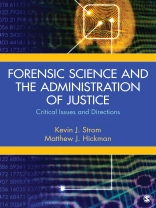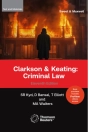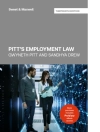Uniting forensics, law, and social science in meaningful and relevant ways,
Forensic Science and the Administration of Justice is structured around current research on how forensic evidence is being used and how it is impacting the justice system. This unique book—written by nationally known scholars in the field—includes five sections that explore the demand for forensic services, the quality of forensic services, the utility of forensic services, post-conviction forensic issues, and the future role of forensic science in the administration of justice. The authors offer policy-relevant directions for both the criminal justice and forensic fields and demonstrate how the role of the crime laboratory in the American justice system is evolving in concert with technological advances as well as changing demands and competing pressures for laboratory resources.
Зміст
Preface
Acknowledgments
Section I. The Demand for Forensic Services
Chapter 1. A Historical Review of the Demand for Forensic Evidence – Joseph L. Peterson
Introduction
Estimating the Demand for Forensic Evidence
What Is Physical Evidence and What Can It Tell Us?
Physical Evidence Presence–Historical Indicators
Macro Forces Influencing Utilization Patterns
Crime Laboratory Census Results
Up-to-Date Utilization Patterns From the ‘Role and Impact’ Study
Conclusion
References
Chapter 2. Is There Evidence of a ‘CSI Effect’? – Rachel Dioso-Villa
Introduction
CSI′s Depictions of Forensic Science
Cultivation Theory
Typology of CSI Effects Found in Media Accounts
Evidence of the CSI Effect
The Perceived CSI Effect
Juror Expectations and Their Understanding of Forensic Science
What Can Be Done?
Conclusion
References
Chapter 3. What We Know (and Don′t Know) About Evidence Backlogs – Matthew J. Hickman and Kevin J. Strom
Introduction
What Is a ‘Backlog’?
What Are the Sources of Backlog?
What Do We ‘Know’ About the Nature and Scope of Forensic Backlog?
The Problem of Artificial Backlog
Do Backlogs Represent Justice Delayed and Justice Denied, or Simply Justice ‘Satisficed’?
References
Section II. The Quality of Forensic Services
Chapter 4. Adopting a Research Culture in the Forensic Sciences – Barry A. J. Fisher
Introduction
Why a Research Culture Does Not Currently Exist in the Forensic Sciences
Recent Developments in the Forensic Sciences
Factors Affecting the Admissibility of Forensic Science
Contemporary Challenges Facing Forensic Science
References
Chapter 5. Minimizing Contextual Bias in Forensic Casework – Reinoud D. Stoel, Charles E. H. Berger, Wim Kerkhoff, Erwin J. A. T. Mattijssen, and Itiel E. Dror
Introduction
Historical Background
Psychological Background
Levels of Contextual Information
How to Deal With Contextual Information
Outlook and Conclusion
References
Chapter 6. A Survey of Ethical Issues in the Forensic Sciences – Jay Siegel
Introduction
Discussion of Ethical Issues
Toward a National Code of Ethics in Forensic Science
Section III. The Utility of Forensic Services
Chapter 7. The Impact of Forensic Evidence on Criminal Justice: Evidence From Case-Processing Studies – Sally Kelty, Roberta Julian, and Robert Hayes
Introduction
The Impact of Forensic Evidence (FE) on Solvability and Case-Processing Outcomes: Evidence From the Literature
Conceptual Framework and Case-Processing Model of Critical Decisions and Leakage Points in Homicide Cases: Findings From the Effectiveness of Forensic Science in the Criminal Justice System (EFS) Project
Conclusion
Cases
References
Chapter 8. Assessing the Utility of DNA Evidence in Criminal Investigations – Michael D. White, Andrea R. Borrego, and David A. Schroeder
Introduction
Empirical Evidence on the Utility of DNA Evidence in Criminal Investigations
Explanatory Frameworks for Understanding Law Enforcement′s Use of DNA Evidence
Conclusion
References
Chapter 9. Forensic Science: The Prosecutor′s Role – Nina W. Chernoff
Introduction
The Rules That Govern Prosecutors′ Use of Forensic Evidence
Why the Rules Do Not Produce Prosecutors Who Are Honest About the Reliability of Forensic Evidence
The Need for Accuracy Advocates
Conclusion
Notes
Section IV. Post-Conviction Issues
Chapter 10. The Problems and Challenges of Evidence Retention – John M. Collins Jr.
Introduction
Personnel
Safe and Secure Facilities
Inventory and Disposition
Forensic Testing
Jurisdictional Case Management
Conclusion
References
Chapter 11. Innovation, Success, Error, and Confidence in Forensic DNA Testing – Kristen Skogerboe
Introduction
History of DNA and Its Application in Criminal Justice
The Role of DNA in Highlighting Limitations in Other Forensic Disciplines
The Intersection of Success, Innovation, and Risk of Error in DNA Testing
The Road to Testing and Exonerations: DNA From a Chemist′s Perspective
Innovation, Challenges, and Emerging Issues in Forensic DNA Testing
Achieving and Maintaining Confidence With a Research Mentality and Quality Assurance
References
Section V. The Future Role of Forensic Science in the Administration of Justice
Chapter 12. Developing New Business Models for Forensic Laboratories – Max M. Houck and Paul J. Speaker
Introduction
Economic Foundations
Metrics and Measurement
A Balanced View
Efficiency and Cost-Effectiveness
Identifying the Best Business Models for Forensic Laboratories
Conclusion
References
Chapter 13. Rethinking the Role of the Crime Laboratory in Criminal Justice Decision Making – Kevin J. Strom and Matthew J. Hickman
Introduction
The Changing Role of the Crime Laboratory
Laboratory Decision Making
Promising Examples of Crime Laboratory Decision-Making Policies
Conclusion
References
Chapter 14. The Future of Forensic Science – Walter F. Rowe
Introduction
Technological Developments
Administrative Changes in Forensic Science
Forensic Science Education
Conclusion
References
Index
About the Editors
About the Contributors
Про автора
Matthew J. Hickman, Ph.D., is an associate professor in the Department of Criminal Justice at Seattle University. His research interests include issues in policing, quantitative research methodology, and the impact of forensic sciences on the administration of justice. He was previously a statistician at the U.S. Department of Justice’s Bureau of Justice Statistics, where he specialized in the development and analysis of national data collections on law enforcement and the forensic sciences. His work has been published in Criminology, Criminology & Public Policy, Journal of Quantitative Criminology, Journal of Forensic Sciences, Crime & Delinquency, Police Quarterly, and Policing. He co-edited a volume titled Police Integrity and Ethics and has contributed book chapters to Race, Ethnicity and Policing: New and Essential Readings, Encyclopedia of Police Science, and The Oxford Handbook on Police and Policing. Dr. Hickman is a member of the American Society of Criminology, the American Academy of Forensic Sciences, and the International Association of Crime Analysts.












